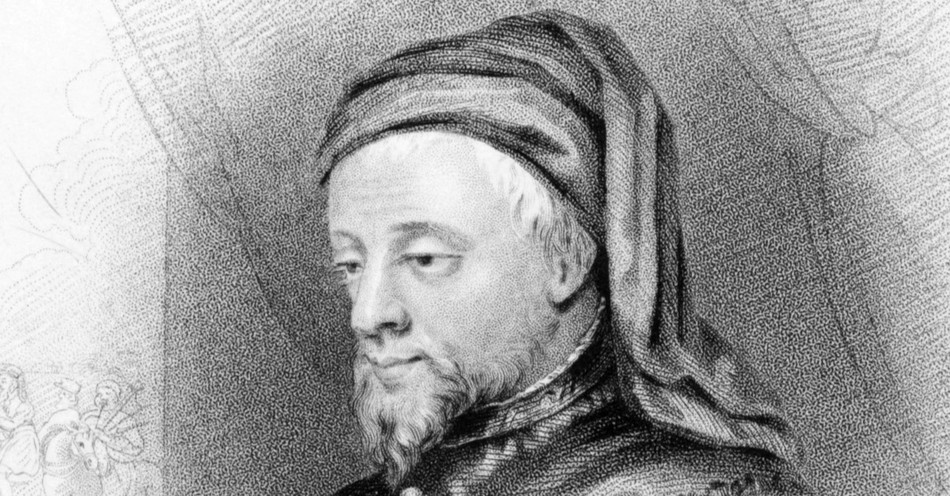What Can Geoffrey Chaucer Teach Us about Christian Writing?
Geoffrey Chaucer was a great poet who understood the power of the written word. He was steeped in the Bible, poetry, and different world mythologies. Using his gift, Chaucer laid the foundation for modern English—he is often called “the father of the English language”—and innovated poetry with new forms like the iambic pentameter rhyme scheme.
But what can Christians learn from Chaucer's example?
What Were the Key Events in Geoffrey Chaucer's Life?
1. Chaucer is born around 1345 in London.
2. In 1356, Chaucer becomes a page to Elisabeth de Burgh, the Countess of Ulster.
3. Between 1359 and 1360, Chaucer is captured on a military expedition in France and saved by King Edward III.
4. Between 1366 and 1367, Chaucer is married to Phillippa Roet and becomes an esquire and valet of the English court.
5. In 1370, Chaucer's first book, The Book of The Duchess, is published.
6. Between 1374 and 1380, Chaucer becomes the controller of customs at London port.
7. Between 1382 and 1386, Chaucer works on his epic poem Troilus and Criseyde.
8. In 1386, Chaucer held many important positions for the ruling monarch of England, including Customs Control and Justice of The Peace.
9. Between 1388 and 1400, Chaucer writes his most famous work, The Canterbury Tales.
10. In 1400, Chaucer dies and is buried at Poet's Corner in Westminster Abbey.
What Christian Themes Appear in Geoffrey Chaucer's Canterbury Tales?
Though Chaucer was a devout Christian, he could be quite satirical of pious, arrogant, self-righteous people. As a humorist, Chaucer used satire in The Canterbury Tales to critique self-righteous churchmen who lacked the humility Christ taught all Christians to exemplify. A good example of this is found in “The Pardoner’s Prologue and Tale.” The Pardoner is portrayed as loving wealth more than God and having no conception of humility.
The Canterbury Tales opens with sojourners going on a pilgrimage to visit Thomas Beckett's shrine in Canterbury. On their pilgrimage, each traveler shares a story in competition. Some of the tales are a satire on pious religious people who profess to be Christian but live a contradictory lifestyle. Some tales are about a certain moral lesson, love, humility, the deceit of Satan, and other interesting themes. Although Chaucer never completed his epic poem, it has inspired many different writers and is still taught today in schools, colleges, and universities.
Wisdom is an important Christian theme in Chaucer's "The Wife of Bath's Tale." In the tale, a knight is accused of the appalling sin of raping a girl by the Queen at King Arthur’s court. After the knight is found guilty, the Queen gives him the opportunity for his life to be spared if he finds out what women most desire. The Queen’s order gives him a year to complete the task. The knight journeys around and eventually finds an ugly older woman who tells him what women desire. After finding the answer, the Knight returns to the Queen and King Arthur. The Queen releases the knight. The knight agrees to marry the ugly old woman since he vowed to pay whatever price she required. The knight treats his wife terribly and regrets the marriage. The wife suggests a hypothetical choice to the knight: between marrying a lady who is beautiful and young but who will be unfaithful or marrying a lady who is ugly and old yet will be true. The knight makes neither choice, saying that the woman should decide.
Because of the knight’s wisdom, the knight's wife turns into a beautiful and faithful woman. She explains that every woman desires complete sovereignty over her husband. The knight’s wisdom in letting her decide correlates to Christ’s command to all Christians to be wise as serpents and innocent as doves, as recorded in Matthew 10:16. Wisdom is a gift from God to humanity to be used for making important decisions—including using discernment, and sharing knowledge with others. The whole book of Proverbs in the Old Testament explores this Christian virtue.
Infidelity and humor are important themes explored in "The Miller's Tale." In the tale, two men named Nicholas and Absalom lust after John the carpenter's wife, Alison. Absalom meets Alison at church and falls in love with her. He seeks to woo her by song and poetry, but Alison does not reciprocate. She begins an affair with Nicholas, who tries to convince John that a flood is coming upon the land he should prepare for. To deter Absalom, Alison promises him a kiss. One night, when they are alone, Absalom believes he is kissing Alison but mistakenly kisses Nicholas. A fight ensues, and Nicholas’ yells awaken John—who cuts the ropes from a suspended bathtub where he is hiding. The bathtub crashes to the floor, alerting everyone in the town. They laugh at John after hearing about the comical events.
In the Christian worldview, honest devotion towards one's beloved is a promise made before God in marriage sanctioned by the church. When infidelity is committed, it breaks the sacred covenant between two people and is a sin in God’s eyes. There are complex and painful ramifications when two people commit an affair. Although "The Miller's Tale" is a farce conveying humor, Nicholas and Alison's infidelity demonstrates how the action causes chaos.
Another key Christian theme in the story is humor. Humor is an important gift from God that is good for one's brain chemistry and soul. Humor lightens people's hearts, brings about laughter, and is communicated through different artistic mediums such as plays, music, books, poetry, and film. Chaucer uses humor throughout many of the stories in The Canterbury Tales.
What Else Did Geoffrey Chaucer Write Beside The Canterbury Tales?
Chaucer's Troilus and Criseyde was published in 1386. It is an epic tragic poem inspired by Greek mythology and set during the siege of Troy. The poem consists of five books written in the rime royal form. In the poem, a Trojan soldier offends the god Cupid. A spell forces the soldier, Troilus, to fall in love with Criseyde. Criseyde's uncle, Pandarus, schemes to bring the lovers together. At first, Criseyde rejects Troilus, but both come to love each other upon their second meeting.
The tragedy happens after Criseyde leaves Troilus to be with his father, Calchus, in the Greek camp, promising she will return. While she is in the Greek camp, Criseyde is wooed by Diomed and never returns to Troilus nor responds to his letters. Troilus dies in battle, and the story ends with him being cursed by fate.
Chaucer's The Book of the Duchess was written in 1370. It is a fascinating, poignant dream poem about lamenting a lost love. Chaucer wrote it to honor the memory of Blanche, Duchess of Lancaster, after the Duchess died from the plague in 1368. Blanche was the wife of Chaucer's best friend, John Gaunt, the Duke of Lancaster.
What Christian Writers Have Been Inspired by Geoffrey Chaucer?
Chaucer’s status as the father of modern English poetry means he inspired many writers, artists, and poets. Below are some important authors he influenced.
The writings of Chaucer greatly influenced C.S. Lewis. Lewis first read Chaucer as a young lad. His first work of literary scholarship, The Allegory of Love, published in 1937, explores the themes of allegory, dream poetry, and courtly love found in Chaucer's works, medieval poetry, and other writers. Chapter four of the book is exclusively dedicated to Chaucer. In the chapter, Lewis writes lucidly about the incredible impact of Chaucer's work on language, culture, and his literary legacy.
Chaucer influenced J. R. R. Tolkien's writings. As a philologist, Tolkien loved different languages. He was fascinated by a language’s origin and its changes through different eras. In this context, Tolkien appreciated Chaucer's contribution to the English language and poetry. Author John M. Bowers wrote Tolkien's Lost Chaucer upon discovering an abandoned project by Tolkien dating from 1951. The never finished book was discovered in the Oxford University Press archives.
The Scottish writer George MacDonald was greatly influenced by the dream vision poetry of Chaucer. The influence is especially clear in MacDonald’s first fantasy novel, Phantastes, published in 1858. The story is a dream-like allegory wherein the protagonist, Anodos, enters a fairyland and goes on a series of adventures that mature his spiritual development.
Walter Wangerin, Jr. was a Lutheran pastor, teacher, and author of many books—including children’s books, fantasy novels, and memoirs. He first became well-known for his 1978 book The Book of the Dun Cow, greatly influenced by Chaucer's "The Nun's Priest Tale" and "The Chanticleer and The Fox Fable." In Wangerin’s The Dun Cow, Chauntecleer the rooster is the flawed hero who fights against the evil character Wyrm. Wangerin not only uses plot elements from the Canterbury Tales but creates comedy in similar ways—interjecting comedy by describing the various characters’ quirks and personalities. While the story includes much comedy, it is also a very serious philosophical work about the triumph of good over evil and chaos.
Books to Learn More about Geoffrey Chaucer
Chaucer: A European Life by Marion Turner
Tolkien's Lost Chaucer by John M. Bowers
Chaucer's Tale: 1386 And The Road to Canterbury by Paul Strohm
Oxford Guides To Chaucer: The Canterbury Tales by Helen Cooper
Walking to Canterbury: A Modern Journey Through Chaucer's Medieval England by Jerry Ellis
The Life and Times of Chaucer by John Gardner
Chaucer: The Life and Times Of The First English Poet by Richard West
Chaucer by G. K. Chesterton
The Poet's Tale: Chaucer and the year that made The Canterbury Tales by Paul Strohm
Chaucer and His Times by Grace E. Hadow
Photo Credit: © Getty Images/GeorgiosArt
Justin Wiggins is an author who works and lives in the primitive, majestic, beautiful mountains of North Carolina. He graduated with his Bachelor's in English Literature, with a focus on C.S. Lewis studies, from Montreat College in May 2018. His first book was Surprised by Agape, published by Grant Hudson of Clarendon House Publications. His second book, Surprised By Myth, was co-written with Grant Hudson and published in 2021. Many of his recent books (Marty & Irene, Tír na nÓg, Celtic Twilight, Celtic Song, Ragnarok, Celtic Dawn) are published by Steve Cawte of Impspired.
Wiggins has also had poems and other short pieces published by Clarendon House Publications, Sehnsucht: The C.S. Lewis Journal, and Sweetycat Press. Justin has a great zeal for life, work, community, writing, literature, art, pubs, bookstores, coffee shops, and for England, Scotland, and Ireland.
This article is part of our People of Christianity catalog that features the stories, meaning, and significance of well-known people from the Bible and history. Here are some of the most popular articles for knowing important figures in Christianity:
How Did the Apostle Paul Die?
Who are the Nicolaitans in Revelation?
Who Was Deborah in the Bible?
Who Was Moses in the Bible?
King Solomon's Story in the Bible
Who Was Lot's Wife in the Bible?
Who Was Jezebel in the Bible?
Who Was the Prodigal Son?









